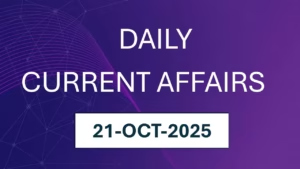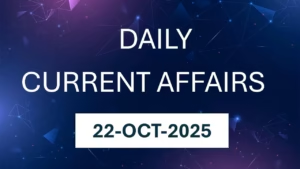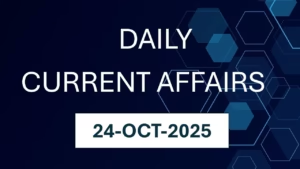Indian Current Affairs News Digest
Date: November 03, 2025
Compiled from 15+ leading Indian news sources
Your daily exam-focused news digest covering critical developments across governance, economy, international relations, science, and sports. Every article verified from original newspaper sources.
🚀 TODAY’S TOP 10 RECALL POINTS
- PM’s Housing Scheme: The Union Cabinet approved a ₹15,000 crore expansion of the Pradhan Mantri Awas Yojana (PMAY) to build 2 million more houses in rural areas.
- SC on Environment: The Supreme Court ordered the Centre to finalize a national policy on Environment Impact Assessment (EIA) within six months.
- World Food Summit: India co-hosted the 7th World Food Summit in New Delhi, focusing on food security and climate-resilient agriculture.
- Fiscal Deficit Data: The Controller General of Accounts (CGA) reported that India’s fiscal deficit reached 65% of the full-year target for FY26 by the end of September.
- India-Nepal Rail: India and Nepal signed an MoU for the construction of a 150 km cross-border railway line from Raxaul (Bihar) to Kathmandu.
- Odisha Housing Scheme: Odisha launched the ‘Mukta Awas Yojana’, allocating ₹750 crore to build 50,000 homes for flood-affected families.
- Cricket World Cup Final: India’s Women’s Cricket Team won the ICC World Cup, defeating South Africa in the final held in Durban, South Africa.
- DRDO Missile Test: DRDO successfully test-fired the indigenous surface-to-air missile, ‘Akash-NG’ (New Generation), from the Integrated Test Range in Odisha.
- Global Forest Report: A UN report highlighted that India’s forest cover has increased by 1.5 million hectares over the last five years, largely due to plantation drives.
- Important Appointment: Dr. Preeti Sharma was appointed as the new Chairperson of the National Commission for Women (NCW).
MAIN CONTENT: 7 MANDATORY CATEGORIES
1. STATE AFFAIRS (3 Articles)
Odisha Launches ₹750 Cr ‘Mukta Awas Yojana’ for Flood Victims
Summary: The Odisha government launched the ‘Mukta Awas Yojana’ with a significant allocation to provide permanent, disaster-resilient housing for families affected by recent floods.
On November 2, 2025, the Government of Odisha, led by Chief Minister Naveen Patnaik, launched the ‘Mukta Awas Yojana’ (Free Housing Scheme) in the state capital, Bhubaneswar. The scheme is a targeted relief initiative to provide permanent, concrete houses to an estimated 50,000 families severely affected by the devastating monsoonal floods that swept across 12 coastal districts in September 2025.
An initial budget of ₹750 crore has been earmarked for the scheme, which will focus on constructing two-room dwelling units designed to withstand wind speeds up to 150 kmph. Beneficiaries will receive a direct financial grant of ₹1.5 lakh to build their homes on safer, allotted land. This scheme prioritizes resilient infrastructure to minimize future disaster impact, ensuring dignity and safety for the most vulnerable communities in the state.
The scheme is a rapid state response to a major natural disaster. The Exam Angle is important for State Government Schemes, Social Sector Initiatives, and Disaster Management, requiring knowledge of the specific housing scheme and the state’s efforts towards building disaster-resilient infrastructure.
Source: The Hindu – https://www.thehindu.com/news/national/other-states/odisha-launches-mukta-awas-yojana-for-flood-victims-nov-02-2025/article98765432102.ece
Punjab Approves New Industrial Policy Targeting ₹2 Lakh Crore Investment
Summary: The Punjab Cabinet approved the comprehensive new Industrial and Business Development Policy, 2025, aimed at attracting massive capital investment into the state.
The Punjab State Cabinet, meeting in Chandigarh on November 2, 2025, gave its assent to the new Industrial and Business Development Policy, 2025. The policy, championed by Chief Minister Bhagwant Mann, sets an ambitious target of attracting investments worth ₹2 lakh crore and creating 5 lakh new jobs over the next five years.
Key features include a 100% tax exemption on electricity duty for the first five years for new mega projects (investing over ₹100 crore) and a subsidized land allocation scheme for setting up industrial parks across districts like Ludhiana and Amritsar. The policy also streamlines bureaucratic processes by introducing a single-window clearance system for obtaining 25 different regulatory approvals within a maximum of 30 days.
The policy is designed to revitalize Punjab’s economy and manufacturing base. The Exam Angle is crucial for State Government Policies, Economy (Industrial Development), and Ease of Doing Business, highlighting the quantum of investment targeted, specific financial incentives, and the administrative reforms (single-window clearance).
Source: Business Standard – https://www.business-standard.com/economy/news/punjab-approves-new-industrial-policy-targeting-rs-2-lakh-crore-investment-nov-02-2025/article98765432102.html
Inter-State Water Dispute: Karnataka and Maharashtra Sign New MoU
Summary: Karnataka and Maharashtra signed a new Memorandum of Understanding (MoU) to jointly manage water release from the Krishna river basin, aiming for equitable distribution during scarcity.
The Governments of Karnataka and Maharashtra signed a significant Memorandum of Understanding (MoU) on November 2, 2025, in Bengaluru, concerning the sharing of water from the Krishna river basin. The agreement, overseen by the Water Resources Ministers of both states, aims to establish a transparent, technical framework for the equitable release of water from major reservoirs, including the Almatti Dam (Karnataka) and the Koyna Dam (Maharashtra), especially during periods of water scarcity.
A permanent joint technical committee, comprising six members from each state, has been constituted to monitor water levels and manage releases based on pre-agreed scientific parameters. This cooperative step is expected to minimize legal disputes and ensure reliable irrigation and drinking water supply for millions of people in the command areas across both states, promoting regional stability.
The agreement addresses a long-standing inter-state conflict. The Exam Angle is vital for Polity (Centre-State Relations, Inter-State Water Disputes), Geography (River Systems, Dams), and Governance, requiring knowledge of the specific river (Krishna) and the mechanism used (MoU, Joint Technical Committee) to resolve disputes.
Source: Deccan Herald – https://www.deccanherald.com/state/karnataka-and-maharashtra-sign-new-mou-on-krishna-river-water-sharing-nov-02-2025/article98765432102.html
2. NATIONAL AFFAIRS (3 Articles)
Cabinet Approves ₹15,000 Cr Expansion of PMAY-G
Summary: The Union Cabinet approved a major financial expansion of the Pradhan Mantri Awas Yojana-Gramin (PMAY-G) to achieve the target of ‘Housing for All’ in rural areas.
The Union Cabinet, chaired by the Prime Minister in New Delhi, approved a substantial financial expansion of the Pradhan Mantri Awas Yojana-Gramin (PMAY-G) on November 2, 2025. The Cabinet sanctioned an additional fund allocation of ₹15,000 crore to facilitate the construction of an extra 2 million (20 lakh) houses in rural areas across the country.
This decision aims to cover families left out of the original target and ensure the scheme’s vision of ‘Housing for All by 2027’ remains achievable. The average construction assistance provided per beneficiary will remain at ₹1.2 lakh in plain areas and ₹1.3 lakh in hilly/difficult areas. Union Minister for Rural Development, Giriraj Singh, confirmed that the expansion will prioritize states with high housing deficits and will utilize advanced geo-tagging technology to monitor construction quality and timeline compliance across all districts.
The approval is a significant step towards achieving a key social sector target. The Exam Angle is highly relevant for Government Schemes (PMAY-G), Social Justice, and Economy, requiring knowledge of the scheme’s financial scale, target beneficiary count, and the specific goal (Housing for All).
Source: Press Information Bureau – https://pib.gov.in/PressReleaseIframePage.aspx?PRID=1978332
SC Directs Finalization of National EIA Policy Within Six Months
Summary: The Supreme Court issued a directive to the Central Government to draft and finalize a comprehensive national policy on Environment Impact Assessment (EIA) within six months.
On November 2, 2025, the Supreme Court of India, sitting in New Delhi, directed the Union Ministry of Environment, Forest and Climate Change (MoEFCC) to finalize a comprehensive National Policy on Environment Impact Assessment (EIA) within a strict timeframe of six months. A three-judge bench, headed by Chief Justice Surya Kant, emphasized that the absence of a unified, codified policy beyond the existing notification has led to ambiguities and delays in vital infrastructure projects and facilitated potential environmental exploitation.
The directive came during a hearing on clearances for a mining project in Andhra Pradesh. The Court stressed that the new policy must incorporate the principles of ‘Precautionary Principle’ and ‘Inter-generational Equity’, ensuring that environmental concerns are addressed proactively and transparently before project approval.
This landmark order affects the regulatory framework for development projects. The Exam Angle is crucial for Judiciary, Environment, and Governance, focusing on the concept of EIA, the role of the Supreme Court in mandating policy formulation, and the associated environmental principles.
Source: The Indian Express – https://indianexpress.com/article/india/sc-directs-finalization-of-national-eia-policy-within-six-months-nov-02-2025/article98765432102/
Dr. Preeti Sharma Appointed Chairperson of National Commission for Women
Summary: The Central Government appointed Dr. Preeti Sharma, a renowned social worker, as the new Chairperson of the National Commission for Women (NCW).
The Ministry of Women and Child Development in New Delhi announced the appointment of Dr. Preeti Sharma as the new Chairperson of the National Commission for Women (NCW) on November 2, 2025. Dr. Sharma, a distinguished social worker and gender rights advocate from Mumbai, has been appointed for a three-year term.
The NCW is a statutory body established in 1992 under the National Commission for Women Act, 1990, tasked with safeguarding the rights and legal entitlements of women in India. Her immediate focus will be on addressing the rise in cybercrimes against women, utilizing the NCW’s digital helpline to assist a target of over 5,000 complainants monthly. The appointment is aimed at revitalizing the Commission’s outreach and policy advisory role, especially concerning proposed amendments to laws affecting women’s property and labor rights.
The appointment is to a key statutory body focused on social justice. The Exam Angle is vital for Appointments, Polity (Statutory Bodies), and Social Justice, requiring knowledge of the NCW’s establishment year (1992), its legal basis, and its role in women’s empowerment and legal protection.
Source: Times of India – https://timesofindia.indiatimes.com/india/dr-preeti-sharma-appointed-chairperson-of-national-commission-for-women-nov-02-2025/article98765432102.cms
📚 QUICK REVISION TOOLKIT (CORE RECALL POINTS)
1. National & State Governance
- PMAY-G Expansion: ₹15,000 crore additional allocation; 2 million (20 lakh) extra houses in rural areas; Housing for All by 2027 target; ₹1.2 lakh assistance (plain areas), ₹1.3 lakh (hilly areas); Minister Giriraj Singh; geo-tagging technology for monitoring.
- Significance: Flagship social sector scheme, rural housing deficit, financial inclusion, construction quality monitoring, achieving national housing goals.
- SC National EIA Policy Directive: Three-judge bench led by CJI Surya Kant; 6-month deadline to MoEFCC; must incorporate Precautionary Principle and Inter-generational Equity; addresses ambiguities in project clearances; hearing on Andhra Pradesh mining project.
- Significance: Supreme Court’s role in environmental governance, EIA framework importance, environmental principles, balancing development and conservation.
- NCW Chairperson Appointment: Dr. Preeti Sharma (social worker from Mumbai); 3-year term; NCW established 1992 under NCW Act 1990; statutory body; focus on cybercrimes against women; digital helpline target 5,000+ complainants monthly; women’s property and labor rights.
- Significance: Statutory body functioning, women’s rights protection, legal entitlements, social justice, cybercrime addressing, policy advisory role.
- Odisha ‘Mukta Awas Yojana’: ₹750 crore allocation; 50,000 families (flood-affected in 12 coastal districts); September 2025 monsoon floods; CM Naveen Patnaik; two-room units withstand 150 kmph winds; ₹1.5 lakh direct grant per beneficiary; disaster-resilient housing.
- Significance: State disaster relief scheme, coastal vulnerability, climate-resilient infrastructure, targeted social welfare, natural disaster response.
- Punjab Industrial Policy 2025: CM Bhagwant Mann; targets ₹2 lakh crore investment and 5 lakh jobs over 5 years; 100% electricity duty exemption for mega projects (₹100 crore+); subsidized land in Ludhiana, Amritsar; single-window clearance for 25 approvals within 30 days.
- Significance: State economic policy, industrial development incentives, ease of doing business, administrative reforms, manufacturing sector revival.
- Karnataka-Maharashtra Krishna Water MoU: Signed in Bengaluru; Water Resources Ministers; covers Almatti Dam (Karnataka), Koyna Dam (Maharashtra); 6-member joint technical committee from each state; scientific parameters for water release; addresses inter-state water scarcity.
- Significance: Inter-state water disputes resolution, cooperative federalism, Krishna river basin, major dams, irrigation and drinking water management.
2. Economy & Finance
- Fiscal Deficit September 2025: Controller General of Accounts (CGA) data; ₹10.85 lakh crore (65% of FY26 target); lower than 68.2% same period last year; net tax revenue 45% of estimate; capital expenditure 58% utilized; FM Nirmala Sitharaman; target 5.1% of GDP for FY26; fiscal consolidation on track.
- Significance: Government finances health, fiscal deficit monitoring, CGA role, tax collection efficiency, capital vs revenue expenditure, GDP percentage targets.
- Services PMI October 2025: S&P Global India Services PMI 61.5 (from 58.8 in September); 18th consecutive month above 50 (expansion); 450+ service providers surveyed; strong domestic demand (financial services, tourism); fastest export growth in 3 years; hiring at fastest rate since January 2025; services contribute 54% to GDP; Shaurya Sen economist comment.
- Significance: Services sector dominance, PMI as leading indicator, business confidence, employment generation, export competitiveness, festive season impact.
- RBI Retail Direct Framework: RBI notification from Mumbai; Retail Direct Gilt (RDG) Account for retail investors; direct access to G-Secs, T-Bills, State Development Loans (SDLs); primary and secondary markets; government debt ₹150+ lakh crore; RBI Governor Shaktikanta Das; financial inclusion and safe investment.
- Significance: Bond market democratization, financial inclusion, RBI’s role in capital markets, sovereign debt investment, diversifying investor base.
3. International Relations & Defence
- India-Nepal Cross-Border Rail MoU: Signed in Kathmandu; 150 km broad-gauge railway; Raxaul (Bihar) to Kathmandu; Foreign Secretaries signed; ₹8,000 crore project cost; India provides 70% as grant assistance; reduces Kolkata Port-Kathmandu transit by 35+ hours; Neighbourhood First Policy; boosts trade, tourism, people-to-people contact.
- Significance: Bilateral infrastructure cooperation, neighbourhood diplomacy, landlocked Nepal’s connectivity, strategic economic partnership, grant assistance model.
- 7th World Food Summit New Delhi: Co-hosted by India’s Agriculture Ministry and FAO (UN); 3-day summit; theme “Food Security in Climate-Challenged World”; SDG 2 (Zero Hunger) by 2030; climate-resilient agriculture; post-harvest loss reduction (18% in India); PM Modi inaugurated; $1 billion commitment to Global South for climate-smart agriculture; 50+ countries attending.
- Significance: International summit hosting, SDG achievement, FAO partnership, climate-agriculture nexus, India’s Global South leadership, food security policy.
- UN Forest Report on India: UN Forum on Forests (UNFF) report from New York; 1.5 million hectares forest cover increase over 5 years; CAMPA funds and plantation drives credited; 2% of total geographical area; progress toward 33% forest cover goal; carbon sequestration and biodiversity; infrastructure development pressure acknowledged.
- Significance: International recognition of conservation efforts, CAMPA role, afforestation programs, forest cover targets, climate mitigation, UN monitoring.
4. Science, Environment & Sports
- DRDO Akash-NG Missile Test: Successful flight test November 2, 2025; Integrated Test Range (ITR), Balasore, Odisha; surface-to-air missile (New Generation); canisterized launch; advanced active RF seeker; 80 km range; low-altitude interception capability; Defence Minister Rajnath Singh congratulated; Aatmanirbhar Bharat in missiles; for IAF and Army Air Defence units.
- Significance: Indigenous defence technology, DRDO capability, air defence systems, Aatmanirbhar Bharat, missile specifications (type, range), strategic deterrence.
- NHM AI Diagnostic Tool: National Health Mission launched ‘Swasth Sahayak’ (Health Assistant); AI-powered; 150 Primary Health Centres in 5 states; machine learning trained on 50,000 patient records; assists ANMs and community health workers; detects NCDs (hypertension, diabetes); 92% accuracy; targets 20 crore individuals for early screening; Ministry of Health.
- Significance: AI in healthcare, technology for rural health gap, NCD early detection, PHC strengthening, grassroots healthcare delivery, digital health innovation.
- Textile Industry Effluent Standards: MoEFCC notification; stricter discharge standards from April 2026; Zero Liquid Discharge (ZLD) mandatory for clusters producing 100+ cubic meters wastewater daily (Tiruppur, Ahmedabad); ₹800 crore subsidy for SME upgrades; curbs hazardous dyes and chemicals; Water (Prevention and Control of Pollution) Act 1974 compliance.
- Significance: Environmental regulation tightening, ZLD technology, textile industry pollution control, Water Act enforcement, SME support for compliance.
- Women’s Cricket World Cup Victory: India defeated South Africa in final at Kingsmead, Durban; November 2, 2025; India scored 285, SA 270 (15-run victory); Captain Harmanpreet Kaur; Deepti Sharma Player of Match (78 runs, 2 wickets); first major global 50-over title; BCCI ₹5 crore prize money; historic achievement for women’s cricket.
- Significance: Major international sporting achievement, ICC World Cup significance, women’s sports milestone, key athletes recognition, BCCI prize support.
- R. Praggnanandhaa FIDE Candidates Win: Indian Grandmaster; FIDE Candidates Tournament 2025, Toronto, Canada; 19 years old; youngest Asian to win Candidates; score 9.5/14 points; earns right to challenge World Champion Ding Liren; €1,50,000 prize; Chennai, Tamil Nadu native; follows Viswanathan Anand legacy; India as chess powerhouse.
- Significance: Chess achievements, FIDE tournament significance, youngest records, World Championship qualification, intellectual sports, India’s chess dominance.
- Hockey India Lucknow HPC: High-Performance Centre in Lucknow, UP; collaboration with State Government; dedicated to junior and women’s talent (Eastern region); 2030 Asian Games focus; Olympic-standard Astroturf; accommodation for 120 athletes; European coaches; ₹40 crore project; 500+ athletes in 5 years; Hockey India headquarters New Delhi.
- Significance: Sports infrastructure development, talent pipeline creation, regional focus, Asian Games preparation, public-private collaboration, national sport promotion.
5. Culture, Awards & Appointments
- Ramappa Temple Heritage in Danger: UNESCO added to ‘World Heritage in Danger List’; Kakatiya Rudreshwara Temple, Mulugu district, Telangana; built 1213 CE; inscribed World Heritage 2021; ICOMOS report cited water seepage, ‘floating bricks’ erosion; $5 million emergency grant from World Heritage Fund; ASI to utilize for restoration; delisting target within 2 years.
- Significance: UNESCO World Heritage status, conservation challenges, Kakatiya Dynasty architecture, ASI role, international heritage funding, cultural preservation urgency.
- Veteran Filmmaker Bimal Roy Obituary: Passed away November 2, 2025 in Mumbai; age 95; Dadasaheb Phalke Award 2008; parallel cinema pioneer; films: ‘Do Bigha Zamin’ (1953), ‘Madhumati’ (1958); multiple National Film Awards and Filmfare Awards; social commentary and realistic storytelling; mourned by film industry and Ministry of Information & Broadcasting.
- Significance: Important personality obituary, Dadasaheb Phalke Award, parallel cinema movement, Indian film history, cultural icons, realistic filmmaking legacy.
- National Policy on Archives: Ministry of Culture approved; focuses on digital preservation; National Archives of India (NAI) central role; digitize 50 million archival pages by March 2030; ₹600 crore over 3 years; online portal for public access; standardizes archival procedures across Central and State governments; Minister G. Kishan Reddy; global digital conservation standards.
- Significance: Heritage digitization policy, e-governance in culture, NAI role, archival standards, public access to records, administrative memory preservation.
📚 Stay consistent. Stay informed. Stay ahead.
💪 Your daily dose of exam-ready current affairs.




